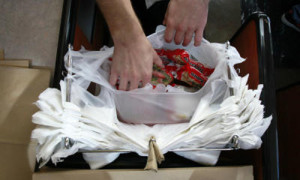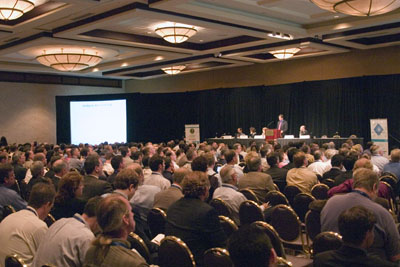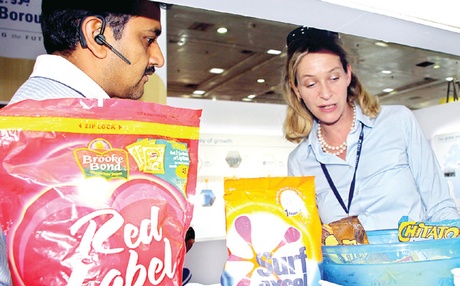SACRAMENTO –– Lobbyists have launched a frenzied eleventh-hour effort to kill a bill that would make California the first state to outlaw flimsy plastic grocery bags, delaying a key vote and setting up one of the fiercest legislative battles of the year.
Last week, the bill seemed in the bag after it cleared a tough committee vote. But in recent days, industry lobbyists who have squashed more than a dozen other proposed bag bans over the past few years have renewed their effort by targeting moderate Democrats.

“We’re going to do everything in our power to educate legislators on the facts,” said Mark Daniels, a senior vice president at Hilex Poly, an East Coast company that is the largest producer of single-use plastic grocery bags in North America.
Opponents led by the company have spent more than half a million dollars in lobbying fees and campaign donations, painting the proposal as a job killer.
But environmentalists are also expressing confidence as they dig in for an epic battle similar to their ultimately successful fight to pass California’s “bottle bill” in the 1980s. The stakes are even higher this year because the clout of environmental groups is on the line after a series of embarrassing legislative defeats last year.
Supporters say a statewide bag ban is needed to wipe out a particularly noxious form of litter that kills marine life in the Pacific Ocean and costs Californians $25 million a year to collect and bury.
“Single-use plastic bags blow out of garbage trucks and landfills all the time. They become litter even after they’ve been properly disposed of,” said Mark Murray, executive director of Californians Against Waste, which championed the beverage container deposit law three decades ago.
The latest lobbying push helped stall an Assembly floor vote on the bill that had been scheduled for Wednesday. Three of the Assembly members being courted by the industry to vote no on the bill — Henry Perea, D-Fresno; Susan Talamantes Eggman, D-Stockton; and Adam Gray, D-Merced — received campaign contributions from Hilex Poly in 2013. None returned phone calls on Wednesday.
If Senate Bill 270 clears the Assembly, the Senate must also pass the measure before Aug. 31, the end of the legislative session.
Hilex Poly is headquartered in Hartsville, South Carolina, and none of its 24 factories is located in the Golden State. But, Daniels said, a significant amount of the company’s plastic grocery bags are sold in California.
The company is also a founding member of the American Progressive Bag Alliance, an advocacy group based in Washington, D.C., that has been running television and radio advertisements against the proposed legislation since April, when the bill was first heard by the Assembly Natural Resources Committee.
According to reports filed with the Secretary of State’s Office, the alliance has spent roughly $440,000 on lobbyists hired to kill plastic bag bans proposed in Sacramento this year and last year by Sen. Alex Padilla, D-Pacoima, whom the alliance has personally attacked in its ads.
In January, Padilla announced a breakthrough compromise with some of the legislation’s other opponents. He agreed to make $2 million from the state’s bottle-and-can recycling fund available to California businesses that want to retool their operations and instead manufacture reusable plastic bags that meet the bill’s rigorous standards. That was enough to convince one major Southern California plastic bag manufacturer to change its mind about the legislation, which is co-sponsored by Sens. Kevin de Leon, D-Los Angeles, and Ricardo Lara, D-Bell Gardens.
In the months before and after Hilex Poly successfully stopped lawmakers’ attempt last year to impose a statewide bag ban, the company made almost $30,000 in campaign contributions to many of the state senators who voted against the bill.
The company’s largest political contribution to an individual lawmaker last year went to Sen. Leland Yee, D-San Francisco, who was indicted this year on corruption and racketeering charges. His campaign for secretary of state received a check from Hilex Poly for $6,800 three months after Yee cast a vote against last year’s bag ban proposal.
Two weeks ago, Hilex Poly added another weapon to its arsenal. The plastic bag manufacturer hired Strategic Solutions Advisors, a firm founded by Frank Molina, who served as a senior adviser to Assembly and Senate leaders before becoming a lobbyist.
If passed and signed into law, the proposal would ban grocery stores and pharmacies from offering customers single-use plastic bags beginning July 1, 2015. And a year later, the rule would apply to convenience stores and liquor stores, too. It would impose a minimum 10-cent fee on any paper or reusable plastic bags sold to customers who forgot to bring their own bags when they shop and sets strict standards for what types of bags count as reusable.
San Jose, San Francisco, Oakland and many other Bay Area communities have already banned single-use bags and imposed fees on paper bags through local ordinances.
“This bill is not about helping the environment,” Daniels said. “It’s a cash grab for grocers who will get to keep all the money they make when they start charging customers for so-called reusable bags.”
Murray of Californians Against Waste acknowledged that it might seem unfair to ban one type of plastic bag while encouraging retailers to use another type. But, he said, the super-thin bags are “ground zero” in the state’s fight against litter.
“Thicker plastic bags that meet quality standards won’t become a problem in the litter stream the same way,” Murray said.
WHAT THE BILL WOULD DO
Starting July 1, 2015, grocery stores and pharmacies would be barred from making single-use plastic bags available to customers. And by the following July, convenience stores and liquor stores would be subject to the new rules, too.Customers would be encouraged to bring their own reusable bags when they shop, but customers who forget would be charged at least 10 cents for recycled paper or reusable plastic bags that meet standards for durability.
The bill would offer competitive loans and grants to plastic bag manufacturers that retool their operations and make reusable plastic bags instead. To qualify for these benefits, companies would need to retain and retrain their workers.









